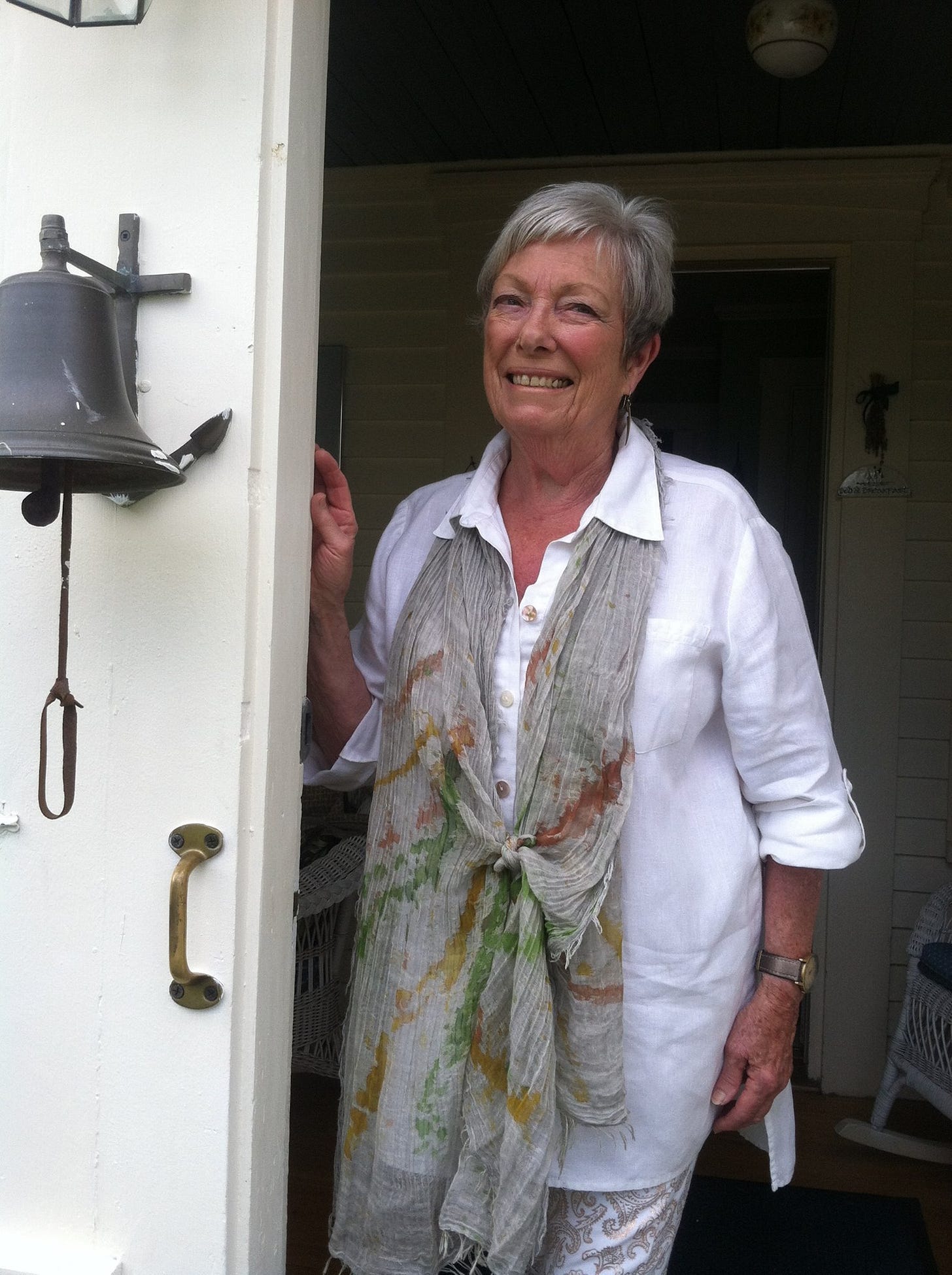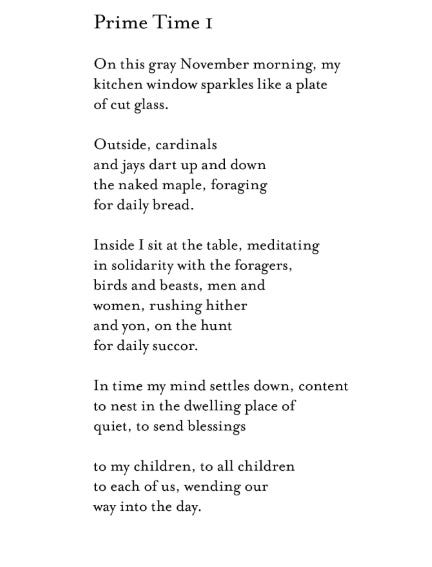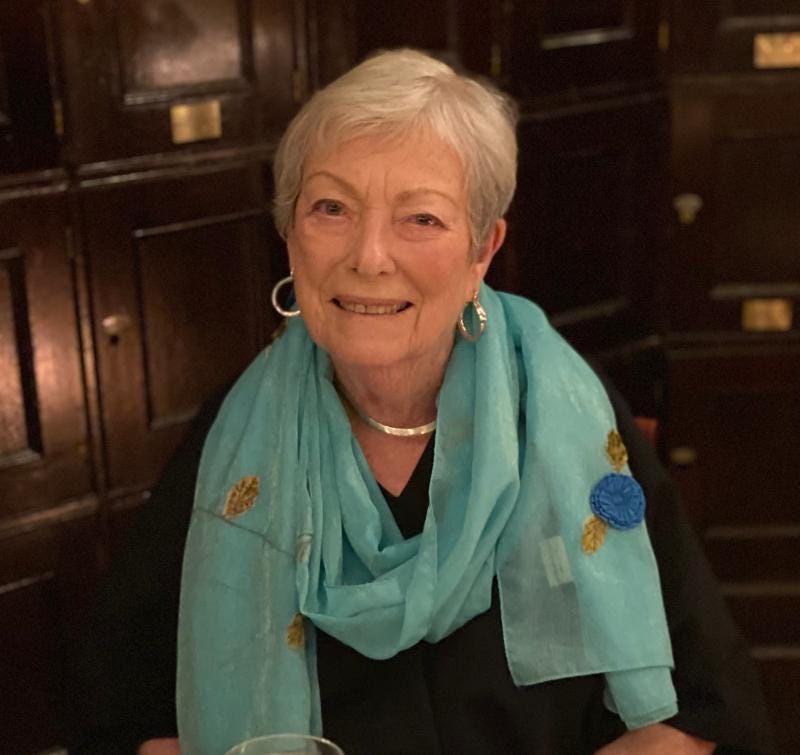I’m writing this in Boston. That seems so appropriate, because Janet was born and raised here. She died October 12. She was 90. She was lovely.
I got to know Janet Shea in Louisville, at Spalding University’s MFA in Writing program, in 2005. I was teaching creative nonfiction at Spalding, and I had her in a workshop I led. In fact, I had her in several workshops, and so got to know her and her writing well.
I can see her now, seated with the other students around the table in one of Spalding’s conference rooms, eager and shy, fulfilling a dream at 70 years old. Because that’s what she was doing, fulfilling a dream to write that she had to put on hold while she raised her five children. She was of a generation before the women’s movement. Women having a career was not what normally happened or was encouraged. But here she was now, doing it.
She wrote about her Irish Catholic childhood in Boston, and what richer material is there than a solid Boston Irish Catholic childhood? I was entranced by her writing, and so were her fellow students. She wrote lyrically and feelingly about her family and about her growing up.
This is from her essay, “Elegy to Jimsey,” about her younger brother. The excerpt was read at her graduation in Louisville:
“On the way home, Jimsey holds the big bouquet close up to his face, nuzzling its cinnamon fragrance. He walks straight and tall beside me, his honey-colored hair blown back off his face, his violet eyes trimmed in mink lashes, a pink birthmark on his forehead, the size of a miraculous medal. He is so beautiful. He smiles at me, the same smile on his lips today while I visit. The same smile he wore when I took him to the movies on a Saturday afternoon when he was six and I was fourteen. We saw Bing Crosby and Bob Hope On the Road to somewhere. Bing, getting ready to board the plane that will take them to Rio, gives a huge, arcing Mr. America wave from the screen. My brother waves back. For years afterwards whenever we got together, we’d greet each other with that Mr. America, Queen Mother, Beauty Pageant Wave—as if it were a magic wand, slicing through the stratosphere of time and place.”
This is what she had inside her, all those years, waiting to emerge. It was a glory to watch her reveal her writing to the group of writers around the table and to see the modest pride on her face when they responded with pleasure and praise after she read.
She lived in Maine in Tenants Harbor on the coast. Coincidentally, I taught in Maine in the summers, and so I visited her several times at her home where she and her husband, John, lived. He was very ill then, and most of her time was spent caring for him. It took its toll. But she was always glad to see me, and I, her.
In 2016, she published a book of poems, Prayers of a Roadside Contemplative. I remember on one of my visits to Tenants Harbor being in her study where she wrote as she read me a few of these poems. It was one of those perfect Maine summer days, bright and sweet-smelling, the air traced with the sea’s presence. Janet was anxious. Were they any good? I thought so. She read them to me in that lilting, honeyed voice of hers. She was born to recite poetry. This is the first poem in the collection:
A year or so later, her husband, John, died. She moved from her home in Tenants Harbor to an apartment in Portland, in one of those assisted living places. (Later, she moved in with her daughter, Alice, in whose home she was blissfully content.) On the way to my teaching job in Maine, I visited her in Portland. I hadn’t seen her since John died. I wrote these lines that follow soon after that visit, so that’s why I know the words she speaks are accurate.
I knocked on the door. It opened, and there she was, with that lovely Boston-Irish face, that smile as big and open as Faneuil Hall. There are some greetings that make you feel ten years younger, and Janet’s is one of them. I walked into a charming apartment. It had cascades of light and intimate touches everywhere.
When I had last visited her in Tenants Harbor, she was trying to bear up under the weight of caring for a very sick husband. Now, here in Portland, she was free from that, and though she was sad about John’s death, she also felt grateful “for the solitude he bequeathed me.” She speaks like this, with the dramatic intimacy of an Irish storyteller. Janet has the most delicious voice, at turns conspiratorial, at turns astonished, at turns instructive. It’s not exactly husky, but it has a cabernet richness to it, and if you heard it on the radio, you wouldn’t want to move the dial. She has a wonderful—I can’t escape that word when talking about her—laugh and smile. Her hair, silver gray, is cut very short.
I sat down. She began telling me what she’d been doing. We talked about many things as we sat there at her table, eating a lunch she prepared—chicken pot pie and fresh tomatoes with basil and olive oil.
She’s 84, and this is how I want to be 84.
Then the talk turned to the place she was living, and the people who live here. I asked her if the place served food.
“Yes. I went a few times, but I didn’t like it. Awful. So, I make my own food. What’s the big deal? You cook. I don’t mind. I did mind when I used to have to make three meals a day all year, but now it’s just me.”
I asked her about living here.
“So many of the people here are…just old,” she said. She looked me straight in the eye. “I just want a decent conversation, about interesting things.”
I asked her if she believed in God.
“No. I believe in something, in an energy that comes from all of us,” she said.
“Life is a mystery,” I said. “I mean, what is it that makes us alive? What is it that’s life and, when it’s gone, is death?”
“Death is with us all the time,” she said. “We live with death.”
“You were raised strictly Catholic, right?” I asked.
“Oh, yes. I was fodder for the convent when I was a girl. I used to believe, but it was those priests and the things they did that soured me. I’m done with that.”
Then I remembered one of the funniest things Janet had ever written for Spalding and done. She had five children, and at times it was overwhelming. It was hard to cope, and who would be able to, day after day, without help? So she would play this game she called “Coffin Mommy,” where she’d pretend she was dead, and none of her five children were allowed to disturb her, because she was dead. She’d lie on the floor absolutely still, arms over her chest, eyes closed. This was how she got a precious few minutes of peace.
We talked about writing and books, and she mentioned Patricia Hampl, whose latest book she was reading. She read me a few passages from the Hampl book. How lovely it was to be read to on a cool June afternoon in Maine in a warm room, the words being read by someone I so liked and admired. I realized I would rather be talking to Janet at that very moment than with anyone, young or old.
I got up to leave. Janet had a movie date with two other women from the building at 2PM. They were going to see The Book Club.
“These four women have all read Fifty Shades of Gray and they meet to discuss that.” She rolled her eyes. “I tried to get out of it. I did once, but they got me the second time.”
She walked me to the door.
“Come visit me,” I said. I was going to spend the whole summer in Maine teaching.
“I’d love to. And let me know what’s happening with you.”
That big smile. Then goodbye.
Goodbye, Janet.





Beautiful, RIch. Hope she's found a sun-drenched writing room on the astral plane.
I’m so glad you mentioned Coffin Mommy and Janet’s wicked sense of humor. At one point she and I talked about soliciting pieces for an anthology to be titled World’s Worst Mother. Our proposal’s sample chapters included Coffin Mommy and my essay on the day my 12-year old daughter found my pot stash. I will miss her more than I can say.